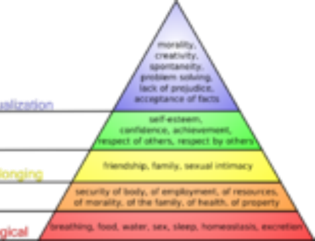Sign up for FlowVella
Sign up with FacebookAlready have an account? Sign in now
By registering you are agreeing to our
Terms of Service
Loading Flow

Humanistic psychology

Humanistic psychology was formulated by Abraham Maslow out of distaste for his neglectful parents. Instead of the usual psychological focus of those heavily inflicted with psychological disorders, Maslow redirected the focus to the average human being. He also emphasized the necessity of observing each person as a singular whole person. This innovative psychological approach focused on the principal that humans exist as good individuals, and so long as their lifestyle remains untampered, and all necessities in life are met, then the person will persist in bettering themselves. The necessities Humanists address are food, water, and shelter. They believe that it only takes a lack of one of these to induce a state of non-progression on human being, or even mental deterioration. The effect of Humanism is often considered questionable at best. Though it is believed that their contribution includes speaking to people you are investigating as though you are eager to know them rather than simply speaking to them with little regard. Basically humanists spoke more candidly to their test subjects than other studies. They were also deeply against experimentation on humans, as they felt the whole practice was immoral, and dehumanizing.
